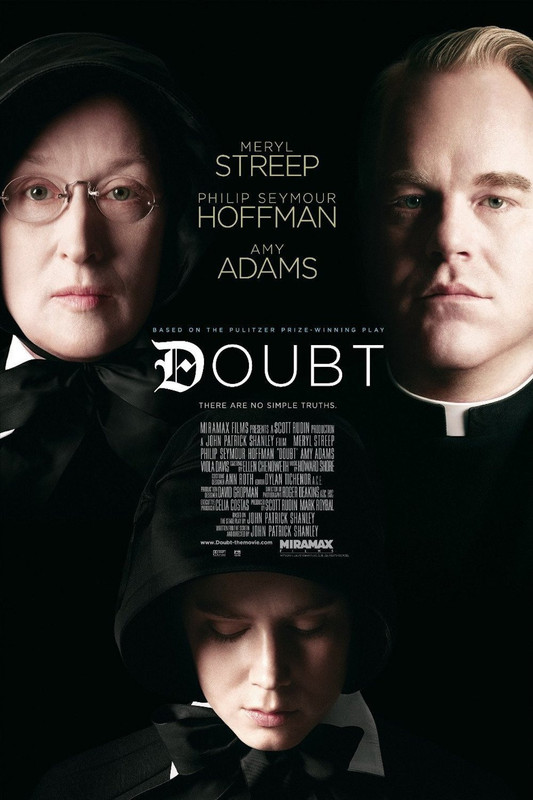Dir: John Patrick Shanley
I try not to read too many reviews, mainly for fear of inadvertently plagiarising someone, but everything I have, thus far, read about Doubt lauds it for the same thing; the film’s ambiguity about its central question; did Father Flynn (Philip Seymour Hoffman) do something inappropriate with Donald Miller, the only black child at the Catholic school he is the pastor to? I have to wonder if the version of Doubt that was press screened was substantially different to the one I saw, because the film I saw ties up almost all its loose ends, lacking only a neatly tied bow.
John Patrick Shanley’s second directorial effort (which comes 19 years after his first) is a film of two halves. The first, which is by far the better, sets out the daily life of a Catholic school in 1964, the world changing around it as principal Sister Aloysius (Meryl Streep) tries to prevent the modern world from encroaching on her school, and by extension her church. This first half also introduces the three powerhouse performers at the centre of the drama. Streep represents the old guard, while forward-looking priest Hoffman and young, innocent Sister James (Amy Adams) both seem to want to put a new, friendlier, face on the church, though, it is implied, for very different reasons. This part of the film draws you into the world and the conflict that erupts in it when Sister James confides in Sister Aloysius about her suspicions of Flynn.
Sadly it doesn’t last, and the second half of Doubt becomes overblown and overwritten, its believability careening downhill, especially in a pivotal scene with Viola Davis, whose excellent performance is negated by dialogue so wildly lacking in credibility that it utterly removes you from the scene. The second half of the film is its most theatrical, built on confrontations in enclosed spaces, and using such hackneyed devices as the plot appropriate thunderstorm to groan inducing effect. The sledgehammer subtlety of the second half is a real disappointment; particularly given the quiet, credible, build of the first half. It’s the neatness, though, that really irks, with a couple of scenes near the end sewing the central issue up far too securely.
That isn’t to say that Doubt is a bad film though. Shanley’s direction opens up the play with plenty of well-composed and evocative shots, all made to look beautiful by Roger Deakins, who is surely the best cinematographer working in the US. However, Shanley’s taste for dutch angles, for little reason and to irritating effect, mars what is otherwise a rather beautiful film.
The main reason to see Doubt, as you might expect, is the acting. Phillip Seymour Hoffman is the 21st century DeNiro, an actor who completely transforms himself in demeanour, in look and in character from film to film. He has some heavy and theatrical dialogue to deliver here, particularly in the clunkily written sermon he delivers towards the end of the film, but he makes every word play. If there is an element of doubt at all at the end of the film it is provided by Hoffman, whose performance draws you in with its ambiguity. It would have been easy to play Flynn as a monster, or as a wronged saint. Hoffman plays him as a flawed man.
Amy Adams has made quirky, irrepressible characters something of a stock in trade, but as Sister James, she plays against type. As a nun who wants to retain her individuality, and use it to inspire her students she calls to mind Audrey Hepburn in The Nun’s Story, and gives a performance that stands the comparison. It’s the smallness of her work that impresses, the detail in her eyes and her face, and the fact that she’s just as watchable when she’s not speaking as she is when there are reams of dialogue for her to say. It’s a small performance, but it's another small wonder from a young woman who is becoming a reliable mark of quality in movies. Meryl Streep goes to the other extreme. Where Adams’ performance is all about detail Streep’s is all bluster and bombast. It’s big and loud and scene hogging and it never makes you think anything besides ‘look, it’s Meryl Streep in a habit’. You can always catch her acting, which isn’t true of her co-stars. This is a performance for the back row of the theatre, not for the close up camera of the cinema, and it hurts the film.
Doubt has moments of greatness; a three way confrontation between Streep, Adams and Hoffman; Hoffman and Adams’ shared scene on a bench; the silent scene in which Sister Aloysius makes Sister James eat a piece of gristle. It also boasts some outstanding contributions, from Roger Deakins, Phillip Seymour Hoffman and Amy Adams. Overall, though it’s not the film it should have been, it is worth seeing for these strong points, and for an excellent first hour.
★★★







0 Yorumlar